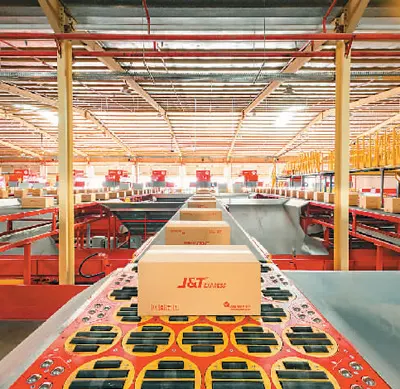A total of 458 outcomes were reached during the recently concluded Third Belt and Road Forum for International Cooperation (BRF), attended by representatives from 151 countries and 41 international organizations. This showcases the tremendous appeal and global influence of Belt and Road cooperation, opening vast business opportunities in trade and investment.
More market entities are witnessing the remarkable growth journey of the Belt and Road Initiative (BRI) over the past decade, penning splendid new chapters of win-win cooperation.
Founded in 2015, J&T Express, a Chinese express company, initially provided delivery services for electronic products to countries like Malaysia, Indonesia, and the Philippines. With the progression of the BRI, the company swiftly emerged as a leading player in the express delivery business in the Southeast Asian market.
In June 2021, Saudi Arabia unveiled the National Transport and Logistics Strategy, aiming to evolve into a global logistics hub connecting three continents, thereby promoting economic development. In the same year, Wang Zijie, J&T Express’ chief operating officer in Saudi Arabia, arrived to expand business in the Middle East.
“Saudis have strong consumption power, but the e-commerce penetration rate is still less than 20 percent. As more people shop online, demand for delivery services will inevitably grow,” Wang said.
He added that amid the joint construction of the Belt and Road, China and Saudi Arabia have accelerated infrastructure cooperation over the past decade, laying the groundwork for the courier sector’s development.
Thanks to the BRI, the local government extended active support to J&T Express, enabling the company to establish a delivery network and a warehousing system covering all of Saudi Arabia in just over three years.
“In the past, when a customer in Saudi Arabia ordered a phone from China online, it might take weeks or even two to three months to receive it. Now, it only takes about a week. In April this year, our express delivery volume increased by over 50 percent year on year,” Wang said.
The BRI aligns well with Saudi Vision 2030, and China and Saudi Arabia have achieved common development through cooperation in various fields in recent years, significantly benefiting the lives of the two nations’ peoples, said Saudi Arabia’s Ambassador to China Abdulrahman Ahmad Al-Harbi at the third BRF.
Moving forward, J&T Express aims to further broaden its delivery network, leveraging its achievements in Saudi Arabia and the United Arab Emirates.
In Bangkok, Thailand, a notable figure in the hardware industry goes by the Chinese name Wen Xiwei. With years of experience participating in various trade fairs in China, the 76-year-old has facilitated numerous Thai businesses in forging partnerships with Chinese suppliers. An increasing number of Thai merchants have sought his assistance in organizing delegations to attend the China Import and Export Fair (Canton Fair) in Guangzhou, located in south China’s Guangdong Province.
“Over the past decade, the BRI has strengthened economic and trade ties between China and Southeast Asia. Take Bangkok, for example; there are now far more Chinese companies and products in many areas like healthcare, transportation, and municipal services,” Wen said.
He added that more Thai friends hope that he can serve as a bridge to help them quickly understand Chinese suppliers.
The 134th Canton Fair’s first phase drew over 100,000 overseas buyers offline, with nearly 70,000 from BRI partner countries. Meanwhile, the event’s second phase attracted 202 enterprises from 29 countries and regions, about 54 percent of which are participating in the BRI.
“The joint pursuit of the BRI has increased trade opportunities between Southeast Asia and China, and opened trade routes in more regions like the Middle East, Europe, Africa, and Latin America. This represents enormous business opportunities and dividends,” said Wen, adding that he will lead more young people to China to negotiate business next year.
In Indonesia, the Jakarta-Bandung High-Speed Railway (HSR), a landmark project under the BRI, commenced official operation on Oct. 2. The HSR reduces travel time between the two cities from more than three hours to just over 40 minutes.
Cui Zuo, general manager of Sany Indonesia, a subsidiary of Chinese machinery giant Sany Group, expressed pride in the operation of the HSR, as it serves as another testament to the global expansion of China’s manufacturing sector. The group provided many machinery units for the construction of the HSR.
Cui is currently overseeing the construction of the group’s flagship factory in Indonesia, which is their first overseas facility designed to meet the advanced Industry 4.0 standard.
Indonesia, one of the largest economies in Southeast Asia, is experiencing rapid development in mining, infrastructure construction, and other fields, but has a weak industrial foundation and relies heavily on imported machinery and equipment.
“Introducing China’s most advanced smart factory to Indonesia is beneficial for showcasing Chinese equipment to the world. Besides, localized operations will bring a wealth of technology, experience, tax revenue, and jobs to Indonesia,” Cui said.










